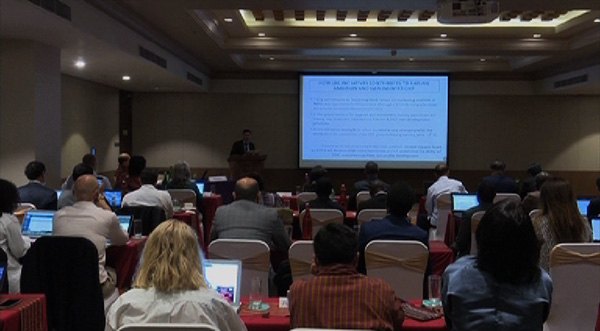 “When it comes taking action on climate change, we do not have time to delay. Our countries are already suffering from its impacts,” Sonam P Wangdi, the Chair of the LDC Group, said.
“When it comes taking action on climate change, we do not have time to delay. Our countries are already suffering from its impacts,” Sonam P Wangdi, the Chair of the LDC Group, said.
In spite of not being major contributors, Least Developed Countries (LDC) remain most vulnerable to the adverse impacts of climate change. And this calls for greater ambitions for all the countries to reduce emissions, develop capacities to adapt to climate change and build resilience.
“What will happen is glaciers are going to melt, sea level is going to rise, people are going to be displaced, and agricultural cropping patterns are going to change. That is why we need to do more, all of us, not just the LDCs,” Sonam P Wangdi said.
“In terms of emissions, we emit only two per cent of the global emissions. But in terms of vulnerabilities, we suffer the most. So that is why our call is for all countries to step up their ambitions in the nationally developed contributions which we have to submit to the United Nations Framework Convention on Climate Change (UNFCCC).”
The LDCs work together under the UNFCCC as a prominent negotiating bloc representing the moral voice of the poorest and most vulnerable countries in the world. This is the first time the LDC group on climate change is meeting under the chairmanship of Bhutan. Bhutan succeeded the Federal Democratic Republic of Ethiopia in chairing the LDC group and will lead the group at the international level until the end of 2020.
After the Paris Agreement in 2015, 195 countries have agreed to limit global temperature rise to 1.5 to 2 degrees Celsius for this century. But as per the Intergovernmental Panel on Climate Change’s 1.5 Degrees Celsius report, the world is already at one degree Celsius of warming. The report also maintains that by 2030 to 2052 global warming is likely to reach 1.5 degrees Celsius. For the LDCs this means impacts of exceeding 1.5 degrees Celsius will fall upon them disproportionately. It is also found that the current nationally developed contributions are inadequate to bridge the emission gap in 2030.
“What science has already given is a clear picture that emissions are rising. The emission has not shown any sign of peaking and going down. So it is urgent that the countries’ emissions should peak and go downwards. But when we see the actions that the countries have presented they are not in line with what science has presented. So that is the reason we are saying that science is not up for negotiations. It is about the survival of people, it is about the existence of countries and communities facing impacts of climate change,” Manjeet Dhakal, the Advisor to LDC Group, said.
To combat and adapt to climate change the LDCs planned three initiatives. But these initiatives are currently in the planning stage.
Experts and negotiators from LDCs are currently in the country to learn about the initiatives.
The initiatives include Renewable Energy and Energy Efficiency for Sustainable Development, Effective Adaptation and Resilience and Universities Consortium on Climate Change contributes to raising ambitions. LDC initiative for Renewable Energy and Energy Efficiency for Sustainable Development is a programme to promote and make renewable energy accessible for all LDCs by 2030 to 2040. LDC Initiative for Adaptation and Resilience ensures long term planning and building resilience to climate change. LDC Initiative for Universities Consortium is to build capacities of the universities to combat climate change.
“It is a science and you need diverse capabilities. And these diverse capabilities are found in universities. This programme is basically to build capacities of the universities in LDCs to combat climate change. Unfortunately, all these three programmes are still in the planning stages. So now Bhutan, our effort as LDC chair, we are actually trying to get it on the ground. We want to focus and get these implemented,” Sonam P Wangdi added.
Under Bhutan’s leadership, the representatives from LDCs will also prepare for the upcoming UN Secretary-General’s Climate Action Summit. The summit will be an opportunity for the LDCs to ask world leaders to take actions in order to fully implement the Paris Agreement.
It has been found that the impacts of climate change are impeding development opportunities for the LDCs. Hurricanes and cyclones, which are made more frequent and severe by climate change affected an estimated 1.5 million people in LDCs in 2018. That resulted in an annual average loss of approximately 8.5 per cent of GDP in LDCs.









